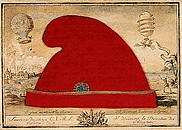The Putney Debates, 28th October 1647 Brèves
Par Jonathan Smyth, Royal Holloway, University of London
Cromwell was deeply disturbed by the propositions which the more extreme groups in the Parliamentary Army had put forward to Fairfax (then head of the Army Council), and particularly the Agreement of the People the Leveller tract which suggested universal male franchise. At the meeting of the General Council of the Army, in St. Mary’s Church, Putney (then a village outside London) on October 28th 1647, a great debate was called at which the two principal opponents were Colonel Thomas Rainsborough, for the Levellers, and General Henry Ireton, for the land-owning gentry who were running the rebellion and the Parliamentary Army. The most famous passage between them is that concerning the liberty of the citizen, the right to vote and to have a direct say in the governance of the country. The Levellers believed in total adult male suffrage – no-one thought much about female suffrage- and the Parliamentarian elite held out for a property-owing or wealth based franchise, which became the law and, in fact continued to be the basis of male adult franchise until the great Reform Acts of the 19th century.
Rainsborough: …for really I think that the poorest he that is in England hath a life to live as the greatest he; and therefore, truly, sir, I think it clear that every man that is to live under a government ought first by his own consent to put himself under that government; and I do think that the poorest man in England is not at all bound in a strict sense to that government that he hath not had a voice to put himself under...
Ireton: …I think that no person hath a right to an interest or a share in the disposing of the affairs of the kingdom, and in determining or choosing those that shall determine what laws we shall be ruled by here – no person hath a right to this, that hath not a permanent fixed interest in this kingdom.

